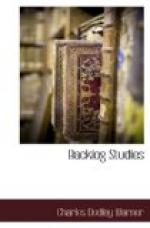The Parson. I supposed you would say that he was a minister. There is another thing about those people. I think they are working against the course of nature. Nature is entirely indifferent to any reform. She perpetuates a fault as persistently as a virtue. There’s a split in my thumb-nail that has been scrupulously continued for many years, not withstanding all my efforts to make the nail resume its old regularity. You see the same thing in trees whose bark is cut, and in melons that have had only one summer’s intimacy with squashes. The bad traits in character are passed down from generation to generation with as much care as the good ones. Nature, unaided, never reforms anything.
Mandeville. Is that the essence of Calvinism?
The Parson. Calvinism has n’t any essence, it’s a fact.
Mandeville. When I was a boy, I always associated Calvinism and calomel together. I thought that homeopathy—similia, etc.—had done away with both of them.
Our next door (rising). If you are going into theology, I’m off..
IV
I fear we are not getting on much with the joyousness of winter. In order to be exhilarating it must be real winter. I have noticed that the lower the thermometer sinks the more fiercely the north wind rages, and the deeper the snow is, the higher rise the spirits of the community. The activity of the “elements” has a great effect upon country folk especially; and it is a more wholesome excitement than that caused by a great conflagration. The abatement of a snow-storm that grows to exceptional magnitude is regretted, for there is always the half-hope that this will be, since it has gone so far, the largest fall of snow ever known in the region, burying out of sight the great fall of 1808, the account of which is circumstantially and aggravatingly thrown in our way annually upon the least provocation. We all know how it reads: “Some said it began at daylight, others that it set in after sunrise; but all agree that by eight o’clock Friday morning it was snowing in heavy masses that darkened the air.”
The morning after we settled the five—or is it seven?—points of Calvinism, there began a very hopeful snow-storm, one of those wide-sweeping, careering storms that may not much affect the city, but which strongly impress the country imagination with a sense of the personal qualities of the weather,—power, persistency, fierceness, and roaring exultation. Out-doors was terrible to those who looked out of windows, and heard the raging wind, and saw the commotion in all the high tree-tops and the writhing of the low evergreens, and could not summon resolution to go forth and breast and conquer the bluster. The sky was dark with snow, which was not permitted to fall peacefully like a blessed mantle, as it sometimes does, but was blown and rent and tossed like the split canvas of




